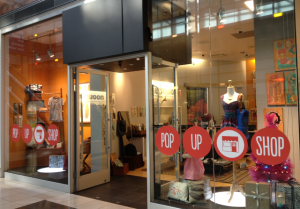 You see them all over the place, those stores that go from totally empty one day, to full and bustling the next and then back to totally empty by the end of the week. They sell everything from quirky art to clothing to sporting equipment. Sometimes they look kind of sketchy. Most of the time they look like fun new stores that are gone before they can ever make much of an impression.
You see them all over the place, those stores that go from totally empty one day, to full and bustling the next and then back to totally empty by the end of the week. They sell everything from quirky art to clothing to sporting equipment. Sometimes they look kind of sketchy. Most of the time they look like fun new stores that are gone before they can ever make much of an impression.
These are called “Pop Up” businesses. They’re quite common during the holidays–all of those kiosks you see pop up in the mall? Those are also, technically, “pop up” businesses. In some cities, though, like Portland and especially in Detroit, they’re a year round phenomenon. Some businesses and companies are even building their brands and identities around their “pop up” nature.
The Benefits of Running a Pop Up Business
At first glance, the Pop Up might seem like a business model for the wishy washy or lazy. In reality, though, there are a lot of benefits to doing a pop up business:
- You can see if there truly is demand for your product
- You can test out the foot traffic in a specific location
- It’s a great way to quickly sell off inventory
- It’s a great for testing out ideas and trying different things
The Real Money Potential in Pop Ups
According to an article published in the Huffington Post last fall, the “temporary retail” industry is worth eight billion dollars a year. That same article went on to say that the number of pop up shops rose by 16% between 2009 and 2012. It stands to reason then, that there are even more of them now.
How Do You Succeed in the Pop Up Business
As someone who is looking for a small and easily managed business, a pop up business should be right up your alley. Just because they are temporary and often experimental, though, doesn’t mean that they are easy. In fact, creating a successful pop up takes a lot of work. Consider the following:
Location matters. You want a place that has a high volume of foot traffic–especially if this is your first pop up. A great place to start is in the mall, because you can leverage your brand more efficiently there. For example, the Westerfield Kiosk Leasing office has special offers for entrepreneurs who want to open a pop up business within the mall. Malls carry countless consumers whose primary goals are buying things and eating food. This means, that no matter what you are selling, you’ll get eyes on your product.
Make sure you have enough inventory. Because of the temporary nature of a pop-up shop, you probably don’t want to allow your customers to place special orders or to order one offs of items that have sold out. If you’re dedicated to the company, you can always try taking online orders later but for now, physical inventory is key. It’s important to have enough on hand to last the length of your lease.
Find a way to get paid. It wasn’t that long ago that pop ups could only deal in cash or checks. Today, thanks to all fo the different mobile payment options available, you can take credit cards, PayPal and even bitcoin if you set yourself up properly. It’s important, though, that you not use a service that will eat up your profits with its high fees. Do some research and make an informed decision.
There are also things like staffing and taxes to think about. Remember: even though it is temporary, it is still a business. Just because you’re only in it for the holidays or over the summer doesn’t mean that the government won’t still want to take its cut. Make sure you mind your details!
In the end, though, Pop Ups are a great way to get your entrepreneurial feet wet and build your brand. They are definitely worth looking into if you want to start a business of your own.

Pop-up businesses are certainly becoming a growing trend in the retail industry. It’s important for pop-up businesses to have adequate signage so customers can easily locate and find the establishment. Thanks for sharing this info!